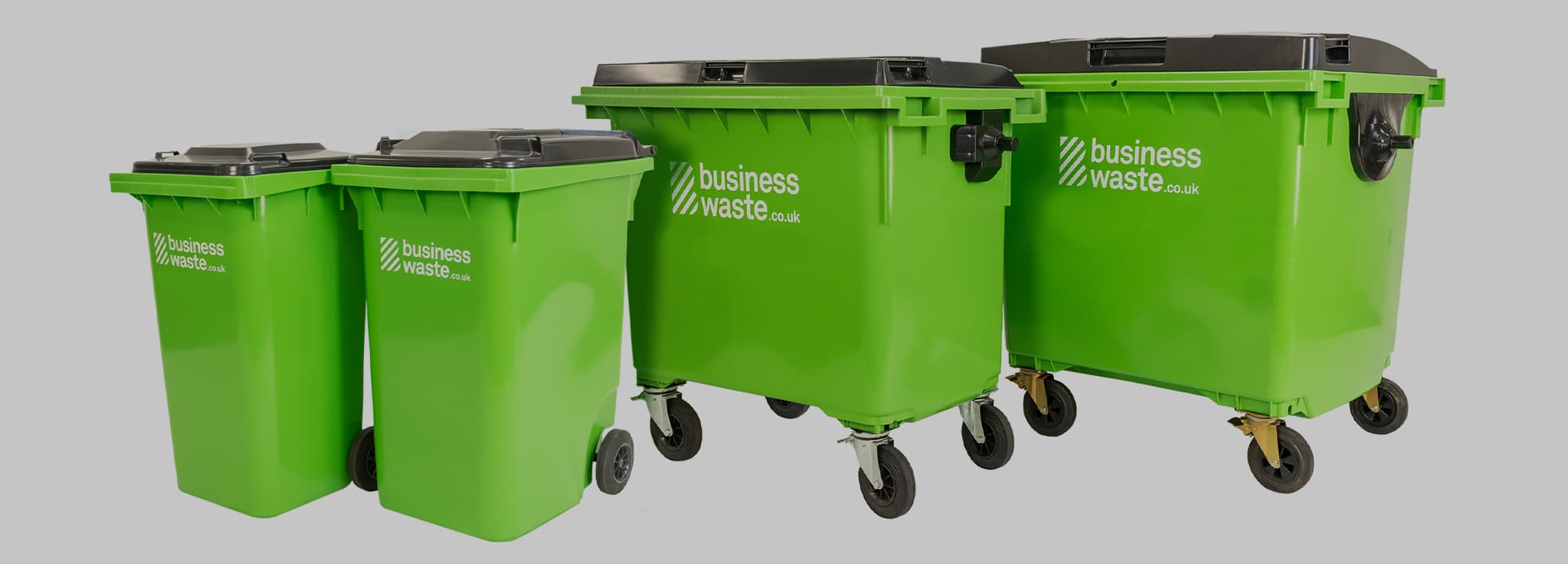
How to Start a Small Business in the UK
Starting a small business in the UK takes a lot of work but can be highly rewarding and exciting. Every year there are 360,000 new businesses in the UK, and they all start small. One in five fails within the first two years so seeking advice on starting a small business is essential.
There are all sorts of legal and financial things you must get right to help launch your small business on a solid foundation. Plus, you need a good idea, the right people and support in place, and plenty of energy. These tips for starting a small business should help whether you’re opening a little bakery, starting a business from home, or anything else.
Use the following steps and advice on starting a small business in the UK to boost your new company’s chances of success.

Get a FREE quote
Get a fast FREE quote for waste collection
- Free quote within 1 hr
- Any type of waste
- FREE bins and delivery
- We cover all of the UK
Research your business idea
Hopefully, you’ve already got a decent business idea in mind. It needs to be a service or product that’s unique, cheaper, better, or different to what’s currently available. This should be something that provides value to your target audience that they can’t get elsewhere. Market research to determine who your intended customers are and what they need is vital.
Undertake competitor analysis as well to check your business idea doesn’t already exist in one form or another. The main things to assess in your competitor analysis are a company’s:
- Size – how many employees and customers, size of their premises
- Costs – their pricing structure for their products or services
- Location – will they be in the same area and direct competition as your business?
- Age – if they’ve been around for a few years it’s a sign of success
- Strengths and weaknesses – what they do well you can emulate, but how can you improve on any of their weaknesses?
- Sales channels – are they an online or offline business? Do they sell anywhere else?
Collecting this information about competitors and your business idea should help determine how viable it is. Seek advice about starting a small business from experts and those who have done it before and show them your idea and competitor analysis. This can provide reassurance that it could be a success or highlight issues to address before you go any further.
Create a business plan
Once you’ve got a solid idea you need to get it written down and fleshed out by creating a business plan. This is a document that outlines your idea for a business and goes into detail about all the important elements. It’s not rigid so can be updated as you go along and adapt to any changes.
A business plan is essential as it provides a clear record of your aims. You’ll need to show it to any potential stakeholders and financial backers to provide reassurance that you’ve thought everything through. Business plans are relatively concise but contain lots of key information about your organisation.
Your new small business plan should include:
- Executive summary of your business idea
- Your products and/or services
- Target market and customers
- Competitor analysis and landscape
- Sales and marketing strategies
- Finances, goals, and projections
- Suppliers, team, and growth aims
Your business plan provides a complete overview of the organisation and should include any challenges and opportunities. It needs to cover all legal and logistical requirements as well, such as information about waste management planning. The numbers need to add up and the processes outlined within it be clear.

Choose a business structure
Deciding on the structure of your new business in the UK is important for legal and tax purposes. Speaking to an accountant or solicitor can provide you with the advice to choose which option is best for your company. There are advantages and disadvantages to each structure, so picking the one that suits your needs is vital.
The four main business structures are:
- Sole trader – as a sole trader you are the only owner of your new business, which means you get to keep all the profits made after tax. However, it also means you’re liable for any losses. This is the simplest option and common for most new small businesses.
- Limited company – this is a private company, and the structure separates your personal and professional finances. You’ll still be an owner and make profits but you’re only legally responsible for any debts to the extent of the amount you invested into the business. It’s a popular structure but more complex to set up.
- Partnership – if you’re starting a new business in the UK with someone else then a partnership is a structure where the profits and management are shared between two people.
- Limited Liability Partnership (LLP) – this is a type of structure that combines a partnership with a limited company. One or all of the partners have limited liabilities. These are the least common business structures but could be worth exploring depending on your situation.
Register your small business
Once you’ve chosen a business structure you’ll need to register with HMRC. Anyone setting up a new business as a sole trader or as part of a partnership must register for self-assessment. This means you’ll pay your own taxes on any earnings and at the end of a tax year you have nine months to pay it.
If you register your new business in the UK as a limited company or limited liability partnership it’s slightly different. You’ll pay corporation tax on any profits. Should your company employ any staff then you’ll also need to register for PAYE and VAT. Proper registration is important to avoid legal and financial issues in the future.
To register your small business as a limited company you’ll need a:
- Company name – it can differ from your trading name but check if it doesn’t exist already on Companies House
- Registered address – this will appear on Companies House, so choose an appropriate address
- Standard Industrial Classification (SIC) code – the nature of your business activity and your trade determines the SIC code
- Named director – at least one named director is required who is legally responsible for the business
- Share details – every shareholder must agree and sign a memorandum and articles of association. These state an agreement to run a business and set out rules for how it’s run.
Seek funding for
starting a small business
How much money you’ll need to start a small business in the UK can vary greatly. The type of company, your location, and existing funds all affect the amount. Your business plan should outline all the costs involved and provide an accurate estimate of how much money you require to start.
Funding for starting a small business can be sourced through various channels. Some of the main places where you can get financial help to start your new business include:
- Grants – there are various start-up grants available in the UK for new businesses. Each one has its own eligibility criteria that normally depend on aspects such as your start-up’s location, industry, and situation. Check the government website for current schemes available.
- Loans – government-backed start-up loans can help get your business up and running but unlike a grant, you’ll have to pay something back. Many banks also offer small business loans. Shop around to find the best one for you and ensure you understand all the repayment terms.
- Investment – angel investors, venture capitalists, and local investors can provide the funds your start-up needs along with expertise and experience. However, make sure you’re happy with what they expect in return.
- Crowdfunding – raising funds for new businesses through online crowdfunding platforms is a popular modern alternative way to secure finance for a start-up. There are also peer-to-peer lending platforms that could help.
- Asset finance – starting a new UK business requires covering all sorts of overheads. Asset finance offers a way to cover the costs of all assets you need to get started without needing the funds to invest in them upfront.

Cover all legal requirements
for starting a small business
There are various legal requirements when starting up a small business. You may have registered and sorted out your tax with HMRC but there’s plenty more you need. Ensuring all the paperwork and documents are in place before you begin can save a lot of time, effort, and money in fixing legal problems later.
Legal requirements for starting a small business include compliance with a few important areas of the law:
- Business law – to comply with various areas of business law you need Companies House and/or HMRC papers to prove you’re registered, data protection documents, tenancy agreements for any premises, contracts and details for any finance, contracts for goods and services, and documents covering intellectual property.
- Employment law – if your start-up has one or more employees (besides yourself and any partners) you must have employment contracts in place. Issues such as HR, grievances, and disciplinary also need considering and appropriate measures being brought in.
- Health and safety – any business that has five or more employees must legally have a risk assessment and health and safety policy in writing. An accident and incidents report is required to record any. Public liability cover may be necessary, as well as small business insurance to protect your start-up.
- Tax – you could be investigated by HMRC so keeping all documents relating to tax is important. This includes holding onto and keeping safe bank statements, invoices, records of expenses, and past tax returns.
- Environmental protection – your new business must comply with the Environmental Protection Act 1990. This includes ensuring that only licensed waste carriers remove any commercial waste your business produces from your site. You also have a responsibility to reduce, reuse, and recycle as much waste as possible.
Find suppliers and employees
Search around to find the best suppliers of any products, materials, or services your start-up needs. Shop locally to support the community and reduce any energy and emissions for transporting goods you require. Once you’ve found suppliers that suit your start-up get all the contracts in place and begin your working relationship.
If your business needs staff then you should also try to find some employees at this point. Online platforms like LinkedIn are a great place to search, you could use a recruiter if your finances allow, or place adverts online. Develop a hiring strategy so you know exactly who you’re looking for to represent your new company.
Launch and grow your start-up
After lots of hard work and preparation, you’re hopefully ready to launch your start-up in the UK. Having a website and social media accounts is vital in the modern world to help spread the word and provide an easy way for potential customers to get in touch.
Get a range of branded materials ready and boost your marketing activities to generate interest. This will vary depending on the nature of your new business but could include sending out press releases to local newspapers, posting in local Facebook and community groups, or simply sticking up posters in your area.
As your small business gets going you must regularly review your business plan to stay on track. Hopefully, everything goes well, and you can start to grow over time to become one of the 25% of new businesses in the UK that make it past their 15th anniversary.
Get a fast and free quote
Get a fast FREE quote for your waste collection
- Free quote within 1 hr
- Any type of waste
- FREE bins and delivery
- We cover all of the UK